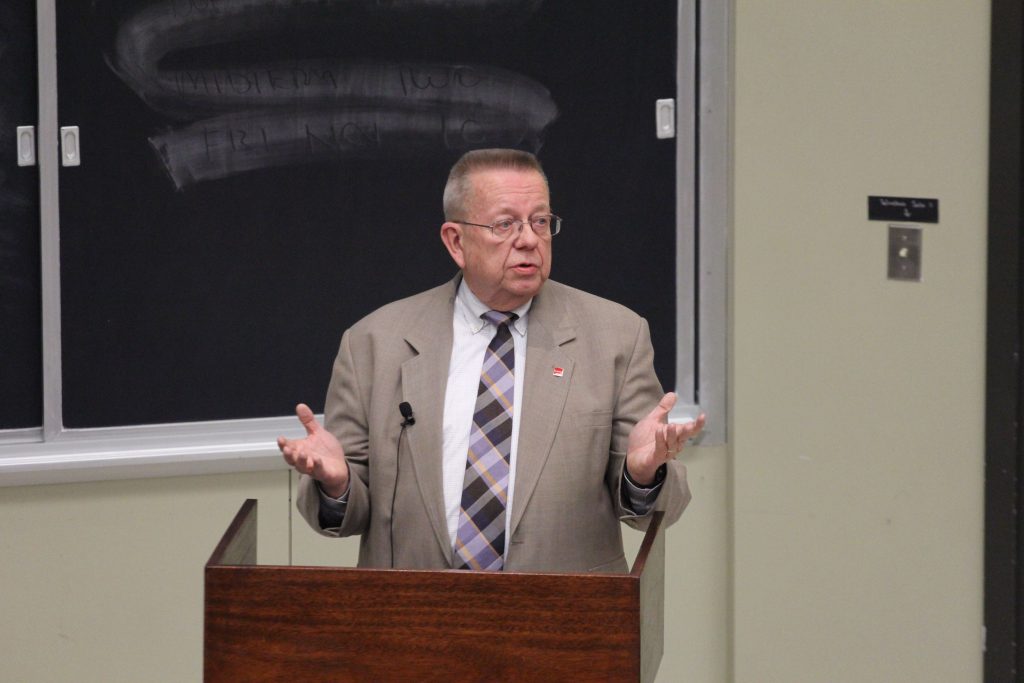
Gerrymandering, union protections, environmental issues and reproductive rights are all addressed in New York’s state constitution. On Nov. 7, state residents will determine if that constitution will be open to amendment in 2019.
The question of whether New York will hold a constitutional convention is growing as Election Day approaches, and on Wednesday night, students and faculty at Binghamton University joined the statewide conversation at the “Should New York Approve a Constitutional Convention?” debate.
The debate was co-sponsored by BU’s Center for Civic Engagement (CCE) and Defend It, Inc., a nonprofit that aims to improve community knowledge on controversial issues through civil debates. It featured guest speakers Marion Irwin, a member of Citizen Action, and Henrik Dullea, Cornell University’s vice president emeritus for community relations. While Irwin argued against the constitutional convention, Dullea argued for it.
Prior to the debate, Wendy Martinek, associate professor of political science at BU, provided background on the upcoming vote. The vote occurs every 20 years and is one of two ways to change the New York state constitution. New York has held nine constitutional conventions, the most recent in 1967, when a convention was held but no amendments were passed.
According to Ben DeAngelis, political engagement coordinator for the CCE and a Ph.D. candidate in the College of Community and Public Affairs, the background provided by Martinek was crucial, because many students are uneducated on the constitutional convention and its potential impacts.
“When we were doing our voter registration drives, we found a lot of people, specifically students, didn’t know about this question, so we shifted our energy to pulling this together,” DeAngelis said. “Our mission at CCE is to create educated voters, and students are really the perfect population to educate because students really have the energy to learn about new things.”
Martinek’s introduction included a list of issues, laws and clauses already included in the state constitution, such as Forever Wild, a clause that protects New York’s state forests from being sold, leased or developed, and the Blaine Amendment, which forbids government aid to religiously affiliated educational institutions. She also addressed some of the amendments that could be added in a constitutional convention, including new laws on gerrymandering, early voting and the selection process for New York judges.
Following Martinek’s introduction, Irwin and Dullea began the debate. Rob Kilmer, an attorney and president of Defend It, Inc., served as a moderator and posed questions to both sides, some from a predetermined list and others from the audience.
Irwin argued that current laws within the state constitution, such as union protections, reproductive rights and Forever Wild, were too important to risk. She said she’d like to see changes to the constitution, but now isn’t the right time and the political atmosphere isn’t conducive.
“I believe that most progressive platforms are coming under attack nationally and statewide,” Irwin said. “I feel that we’ve never had so much big money influencing all sorts of things, and it’s hard to figure out who is paying for things.”
Dullea said he feels the constitutional convention could be a way to address major problems in New York and change the path of the state for the better. He said state legislators will never make the necessary changes, and highlighted gerrymandering as a key issue that a constitutional convention might be able to address.
“They don’t want to have, for instance, the prohibition on gerrymandering, which was contained in the proposed ‘67 constitution,” Dullea said. “It’s been 50 years since the voters rejected that entire constitution, which had many good things in it. The legislature had 50 years to submit that proposal, and they never did it. And they certainly don’t want something like term limits.”
Ashley Saparzadeh, a junior majoring in integrative neuroscience, attended the event and said she was excited to see students getting involved and asking questions.
“Students need to get more involved in the political aspect of our state,” Saparzadeh said. “A lot of students get lost in that and need to become more educated. I don’t know a lot about this topic, and am here to learn more myself.”


